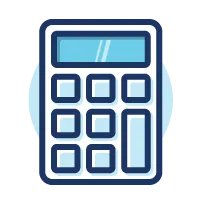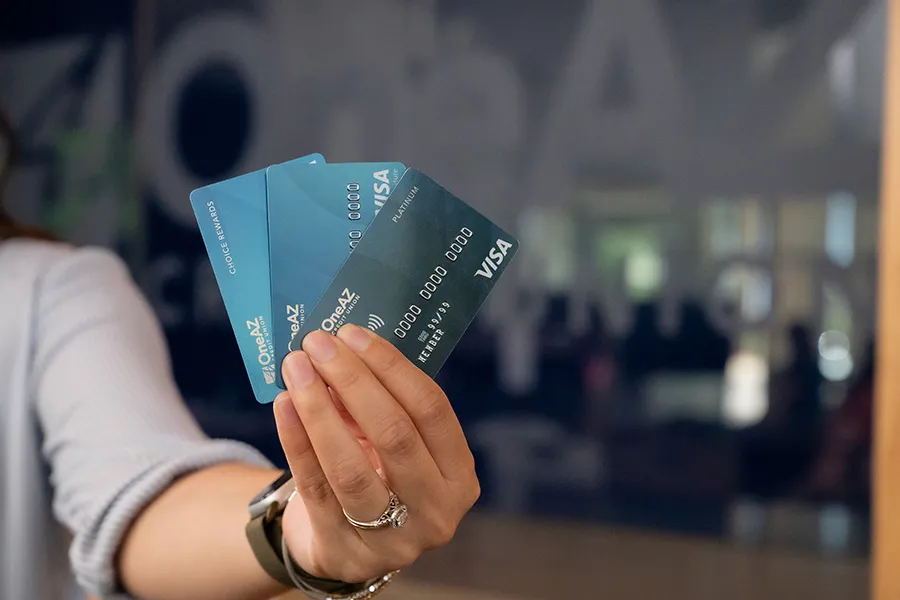What We'll Cover
- How credit card rewards programs work
- How to choose a credit card rewards program that works for your goals and lifestyle
- Best practices for earning credit card rewards while using your card consciously
Are you curious about how to take advantage of credit card rewards but don’t know where to start? With so many options available, it’s difficult to know which option is the right one for you. But that doesn’t have to keep you out of the game.
We’re here to help break down some best practices for maximizing credit card rewards while keeping your credit in check, ensuring points and miles aren’t left on the table from your everyday spending.
3 Types of Credit Card Rewards and How They Work
You’ve probably seen commercials for 6% cash back at the grocery store, 3% cash back at the gas station, triple points when you spend at restaurants, and 60,000 bonus miles for opening a new account.
Before we break down how these credit card rewards really work, remember that those free miles, free cash back and free points aren’t just a generous gift and can come at a cost to your financial well-being.
Americans have $910 billion in credit card debt, with 14 million Americans carrying a $10,000 balance each month with an average interest rate of 16.44%.
In addition to the interest, credit card companies also collect money from annual fees and from charging merchants a percentage of each transaction. All of this is important for you as a credit card holder to be aware of before deciding to sign up for your next credit card rewards program.
With that said, you still can earn rewards and pay off your balance in full each month, so you’re taking advantage of credit card rewards without digging yourself into a financial hole.
Now, let’s break down the three different categories for credit card rewards.
Cash Back Rewards
A credit card offering cash back rewards allows you to earn cash back for purchases you make on your credit card.
Cash back rewards are also the most straightforward when it comes to credit card rewards programs. Unlike credit card points or miles where you have to determine how much points are worth and how to redeem them, cash back rewards are simple — it’s just cash back based on a percentage of what you spend.
How Cash Back Rewards Work
Some cash back cards offer a flat rate on all transactions, whereas other cash back cards offer tiered rates based on where you make your purchases.
For example, a cash back rewards card may offer 6% cash back on groceries, 3% cash back at the gas station, and 1% cash back on all other transactions. You may also find rewards programs that have rotating categories. You may see 3% cash back on dining out during the first quarter of the year and then 3% cash back on travel during the summer months.
cash back on groceries
cash back on gas
cash back on other transactions
cash back on restaurants
Redeeming your cash back rewards can be done in a few different ways depending on the credit card you’re using. Some rewards programs will offer statement credit that can be applied to future balances, while others allow you to deposit the cash rewards straight into your bank account. Another option may be to use that cash back in the form of gift cards.
How to Take Advantage of Cash Back Credit Cards
Always read the fine print and pay attention to the rewards you’re earning. For example, maybe you choose a cash back card that offers 6% cash back on all purchases made at the grocery store. If you have an average grocery bill of $1,000 per month, this should result in $720 cash back each year!
However, that may not be what actually happens.

MAX spend amount is $6,000
When reading over the fine print, you may find that the 6% cash back on grocery spending has a maximum spend amount of $6,000 and then drops from 6% to 1% cash back. Therefore, the $720 you originally planned to earn drops to $420.
While $420 is still nothing to be upset about, reading the fine print before choosing your next cash back rewards card will help you understand what to expect.
Credit Card Points
Another way to take advantage of credit card rewards is through a point system.
Determining how to earn points, how much the points are worth, and how to redeem them can be a little confusing and overwhelming. However, credit card points are often the most flexible when it comes to applying those points in the form of rewards.
How Credit Card Points Programs Work
Credit card points can be earned and used in a variety of different ways.
For example:
Travel credit card offering
1x - 10x points
10x points for hotels and car rentals
5x points for air travel
1x points for all other purchases
For example, you may see an offer for a travel credit card with a rewards program offering 1x - 10x points. This rewards program may offer 10x points when the card is used for hotels and car rentals, 5x points when used for air travel and 1x points for all other purchases.
Other cards may focus on different spending categories. For example, some give you points for travel, while others favor spending at restaurants. If you have a business rewards card, they will likely give you points for typical business expenses.
How to Take Advantage of Credit Card Points Programs
(1 point = 1 cent)
50,000 points = $500
Travel Credit Card
One of the difficult things about rewards points is determining how to get the most bang for your buck when it comes to redeeming them. Points are not treated the same in each program and it’s often up to you to determine how much the points are really worth.
For example, when looking at your latest rewards statement you may see a balance of 50,000 points which is the equivalent of $500 (1 point = 1 cent).
However, a travel card with 50,000 points may give you a nice bump in value. Instead of 50,000 points being worth $500, they may be worth something like $625. On the other hand, if you decide to use those same points for online shopping, your points may be worth less — instead of $500, they could only be worth $400.
Always check to see where your points will be worth the most before redeeming.
Credit Card Miles

If you’re a frequent flier or just love planning your next getaway, a credit card that allows you to redeem travel miles may be for you. These credit cards are usually attached to a specific airline and the credit card rewards are called miles that are used to purchase future travel on that specific airline.
How Credit Card Miles Programs Work
With credit card miles, every dollar you spend equals one mile earned. Oftentimes, you can earn bonus miles when purchases are made with the airline or through a partner with the rewards program. For example, you may earn 6x miles when using your rewards credit card to purchase an airline ticket and 3x miles when booking a hotel or renting a car.
Redeeming is also easy and straightforward with an airline miles rewards program. Simply go online to book a flight and pay for your travel using your miles.
How to Take Advantage of Credit Card Miles Programs
To get the most out of your miles, try to only use them to book travel on that specific airline. Your miles are actually worth more when used for booking flights than for anything else.
On average, 1 mile is the equivalent of about 1.3 cents when redeeming. Therefore, 10,000 miles would equal $130 to use for travel.
On the other hand, you may have the option to use your miles to purchase merchandise, gift cards, or other partner options the rewards program offers. The problem is often that miles are worth a lot less than they would be if applied to travel on that airline.
To get the most out of your miles rewards program, only use the miles to book air travel on the airline the credit card rewards program is partnered with.
Best Practices to Take Advantage of Credit Card Rewards
Now that you know the three types of credit card rewards programs, you can think more strategically about how to use them and get the most out of your credit card spending.
Pro Tip: It’s important that you do not take on credit card debt to earn rewards. Only take advantage of credit card rewards programs if you can pay off your balances at the end of the month to avoid accruing interest and debt.
Keep these tips in mind when selecting credit cards and determining your rewards strategy.
Determine Your Rewards Goal and a Rewards Program That Matches Your Lifestyle
Start by thinking about what you want to achieve with a credit cards rewards program. Would you rather earn cash back that you can use however you like, or would you rather get flights and hotels paid for?
Then identify your own spending habits. To really take advantage of credit card rewards, choose a program that will allow you to maximize your earnings based on the way you spend money. For example, if you’re a frequent traveler, opt for a credit card that offers rewards on travel expenses. If you spend more on groceries or gas, you may find a card that has higher earning potential in those categories. If your spending is generally mixed, consider a card that rewards all purchases.
Get to Know Your Credit Card and Read the Fine Print
Like we mentioned before, redeeming your cash back rewards can be done in a few different ways depending on the credit card you’re using. Some rewards programs will offer statement credit that can be applied to future balances, while others allow you to deposit the cash rewards straight into your bank account. Some reward a percentage of points only up to a certain spending limit. Always read the fine print so you understand the details of your credit card rewards program and know what to expect.
Determine What You’ll Charge on Your Credit Card
Depending on the credit card and rewards program, you may choose to only use your card for travel purchases or for gas or groceries. To really take advantage of credit cards rewards, you could use your credit card for every purchase – do this with caution! Carrying a balance from month to month will negate the rewards you earn. Only put your everyday purchases on your credit card if you can pay your bill off immediately.
Pay Your Card Off Quickly
Yes, we’re going to say it again – pay off any purchase you may with your credit card as quickly as possible. Avoid using your card for purchases if you cannot pay it all off at the end of the month. No cash back or travel points are worth racking up debt, paying more in interest or hurting your credit score.
Key Takeaways
- You can take advantage of credit card rewards programs by earning cash back, earning points, or earning miles for air travel.
- Select a credit card rewards program that matches your spending habits and goals.
- Often the more you charge on your credit card, the greater your rewards. The key is to pay it off immediately to stay on top of your finances, avoid accruing interest charges, and maintaining a good credit score.
As you see, there are three options when it comes to credit card rewards programs. You can earn cash back rewards, earn points that can be used almost anywhere, or earn miles that should solely be used for air travel.
When choosing which rewards program is best for you, determine where you spend money and how those rewards could then be used to improve your area of life.
If you spend a lot of money at the grocery store, then a cash back card with a bonus for grocery spending may be your best bet. But, if you travel a lot for work and you travel on a specific airline, then a miles program may be a perfect fit. On the other hand, maybe you want a rewards program that offers flexibility. If this is the case, then look for a points card that suits your needs.
Lastly, never sacrifice healthy spending habits for the chance to earn rewards. If you find yourself chasing rewards but also piling on more debt each month, then credit card rewards programs may not be a great fit for you.
Chris “Peach” Petrie is the founder of Money Peach. Money Peach partnered with OneAZ to provide free financial education to members across the state. To learn more about OneAZ’s partnership with Money Peach, click here.
APR = Annual Percentage Rate


















